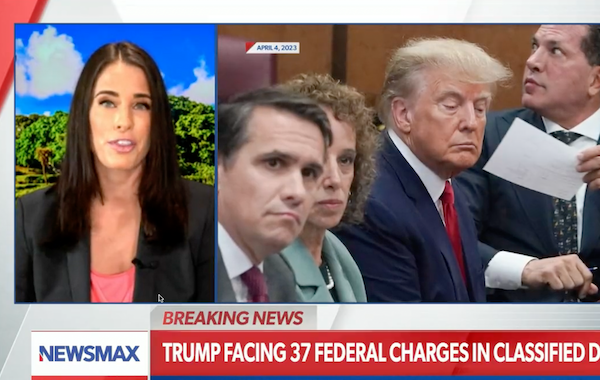Politics
‘DEAD ON ARRIVAL’: Trump Lawyer Rips DOJ Charges, Says Former POTUS Was ‘100% Authorized’ To Keep Documents

Christina Bobb, the attorney for the Trump campaign, strongly refuted the charges brought forth by the Department of Justice, stating that the President was ‘100% authorized’ to retain all the documents he kept during his term in office.
Bobb’s remarks were made amidst the ongoing investigation concerning whether the former President violated the Presidential Records Act by keeping certain documents.
“The difference in how they handled the raid of Mar-a-Lago versus Joe Biden, it’s night and day difference,” the lawyer pointed out during an interview with Newsmax on Monday, pointing out the disparities in the way the cases of the two Presidents have been treated.
Bobb highlighted an incident in August when she was made to wait outside Mar-a-Lago for approximately eight to ten hours in the blistering Florida heat, while the FBI conducted a search inside. “I was forced to stand outside on the circle drive at Mar-a-Lago in August in Florida in 80, 90-something degree heat for about eight to 10 hours while the FBI went through all of the rooms,” she said.
“Donald Trump was 100% authorized to keep everything he kept. And it was actually the Department of Justice that actually had to return materials because they took things they were not allowed to possess and had to return them.” She went on to suggest that if any party was in possession of materials they weren’t authorized to have, it was the DOJ.
WATCH:
“President Trump had every right to have possession of those documents. And the only statute that applies to Donald Trump on this is the Presidential Records Act 44 U.S.C. Section 2203 Alpha, which specifically says the president and only the president is the one who has authority to make this call.”
“I think their case is dead on arrival,” she concluded.
Enshrined in 44 U.S.C. Section 2203, the Presidential Records Act (PRA) is a pivotal piece of legislation that sets the rules for handling the official records of Presidents and Vice Presidents, specifically those created or received after January 20, 1981. This act transformed the legal status of Presidential records from private to public property, establishing a new system for managing these documents.
One of the core tenets of the PRA is the principle of Presidential control over records. From the moment a President takes office, they retain full authority over their records. They can choose to dispose of records that they deem no longer hold administrative, historical, informational, or evidentiary significance. However, this can only be done after consulting with the Archivist of the United States on the proposed disposal.
The PRA also outlines specific restrictions on public access to Presidential records. While it mandates the public disclosure of Presidential records five years post-administration, the President retains the power to invoke up to six specific restrictions, limiting public access for a duration of up to 12 years.
In addition to these provisions, the PRA establishes a mechanism for Congress, courts, and future administrations to gain special access to records that are otherwise closed to the public, thereby ensuring the possibility of checks and balances. This is particularly crucial when claims of constitutionally based privileges are invoked.

